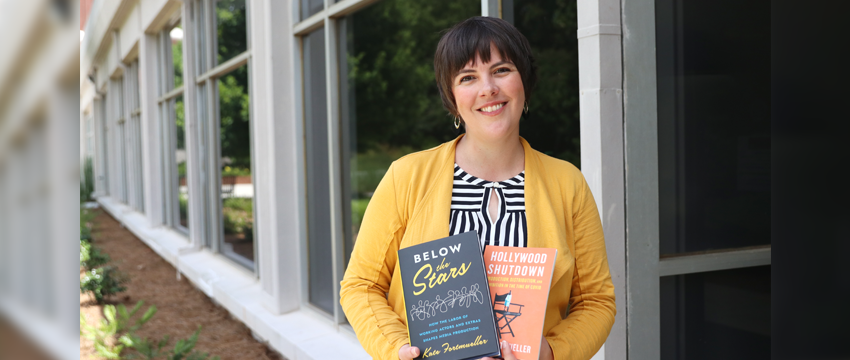Kate Fortmueller examines entertainment labor practices in normal times and during the pandemic

Kate Fortmueller examines entertainment labor practices in normal times and during the pandemic
Editor’s Note: Kate Fortmueller will discuss “Below the Stars” during an Avid Bookshop Zoom discussion July 13 at 7 p.m.
While many people were spending the initial time during COVID-19 watching “Tiger King” and reruns of “The Golden Girls,” Kate Fortmueller was writing not just one book, but two.
Fortmueller’s books, “Below the Stars: How the Labor of Working Actors and Extras Shapes Media Production” and “Hollywood Shutdown: Production, Distribution, and Exhibition in the Time of COVID-19” come out this month by University of Texas Press.
“My interests have always been behind the scenes. If we are going to understand the kinds of stories that are being told and the film and television we are watching, we are going to have to understand the culture that creates them. Nothing will change on-screen if that culture stays the same,” said Fortmueller, an assistant professor in the Department of Entertainment and Media Studies at Grady College.
“Below the Stars” takes a historical look at the impact of extras and working actors and labor unions on the formation of Hollywood and current practices. Fortmueller examines how background actors and central casting started in the early twentieth century, the creation of unions like the Screen Actors Guild, the impact of actors in cable and commercials, and discussions about voice actors and the start of the video game voice actor strike in 2016.
Fortmueller says there is a lot of unglamorous work in Hollywood, much of it due to the fact there are so many actors looking for work—she estimates about 270,000 in the LA area—and the fact they have the biggest union at about 160,000 members.
Fortmueller continues: “When you listen to interviews with actors, they are often very reticent to talk about the kind of power that they have because they feel very beholden to the director who makes decisions. There are a lot of ways they don’t feel empowered. This book is about the ways they do have power and how they have shaped Hollywood’s practices and influenced the way Hollywood does business.”
These topics have been of interest to Fortmueller since childhood thanks to stories her grandfather told her about his time as an extra in Hollywood. In the foreword to the book, Fortmueller describes how he was discovered when he was selling newspapers in front of landmark Musso & Frank Grill, but that he was always trying to piece together different jobs because he was not paid well for acting. She explains there was a perception that these were the golden times of Hollywood thanks to studio contracts, but in reality, many were working in underpaid, unstable jobs and still are today.
Fortmueller was revising the first book when COVID struck the United States in March 2020. Just days into the shelter in place edicts, her editor suggested she add a chapter about how the movie industry was affected by the shutdown.
“Actors were very vulnerable on set at the outset of COVID because they couldn’t wear masks or face shields or do a lot of social distancing,” Fortmueller explained.
The addition of the new chapter in “Below the Stars” led the publishers to ask if she would be willing to write a shorter book examining the effects of the pandemic on production, distribution and viewing during the first nine months of the pandemic.
“Hollywood Shutdown” explores the closing of production and theaters, and the explosion of streaming and Premium Video on Demand during COVID. Fortmueller said that many of the changes that the studios implemented were already planned for the future, however the timeline was advanced.
The book covers topics like “Mulan” being released on Disney+ through PVOD, the decision by HBO Max to release theatrical and made-for-cable projects, AMC’s bankruptcy and how local theaters like Ciné in Athens, Georgia, moved toward virtual screening rooms.
“The biggest lesson learned in the industry is that the theater business needs to reinvent,” Fortmueller said. “I think they need to embrace new strategies to get people into the theaters.”